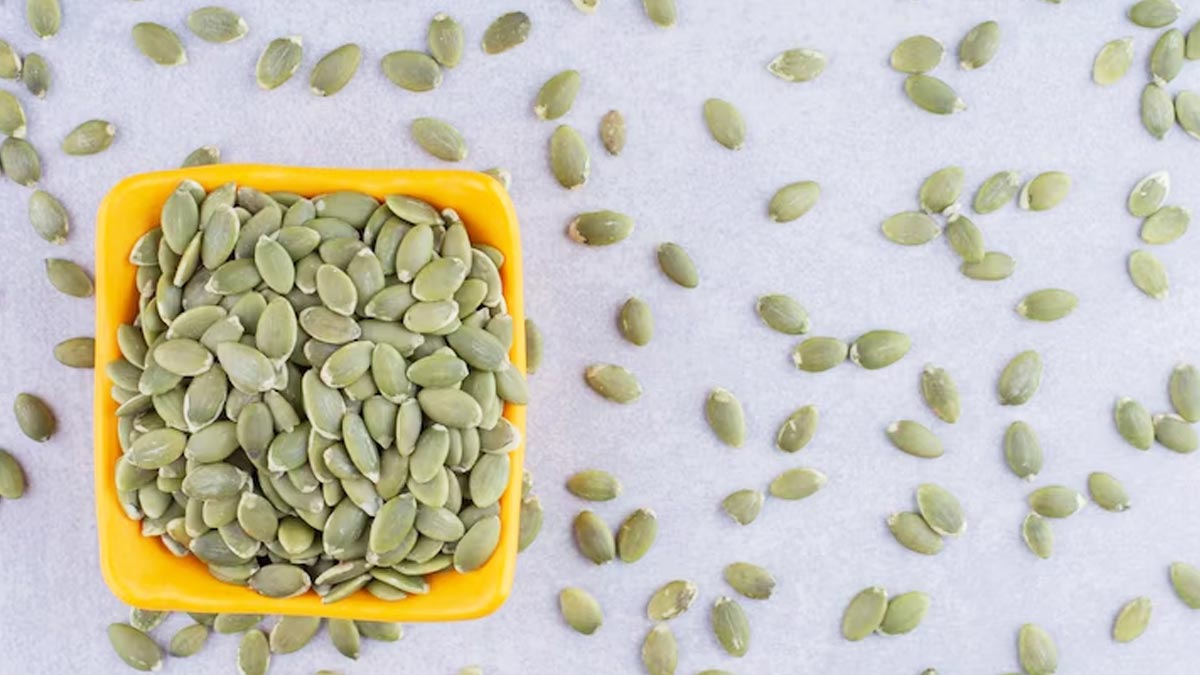
Pumpkin seeds, also known as pepitas, are small, flat, green seeds that are found in the inner cavity of a pumpkin. They have a nutty, slightly sweet flavour and are a popular snack and ingredient in many dishes. But did you know that pumpkin seeds are also a nutritional powerhouse, packed with essential nutrients and health benefits? In this article, we will explore the health benefits of pumpkin seeds and why you should consider adding them to your diet.
Table of Content:-
Nutritional Profile of Pumpkin Seeds
Pumpkin seeds are an excellent source of many essential nutrients, including magnesium, zinc, copper, protein and healthy fats. One ounce (28 grams) of pumpkin seeds contains approximately:
Calories: 151
Protein: 7 grams
Fat: 13 grams
Carbohydrates: 5 grams
Fibre: 1.7 grams
Magnesium: 37% of the RDI (Recommended Daily Intake)
Zinc: 23% of the RDI
Copper: 19% of the RDI
Manganese: 14% of the RDI
Iron: 14% of the RDI
Phosphorus: 33% of the RDI
Vitamin K: 18% of the RDI
Also read: 7 Lifestyle Tips For People Over 40 For Better Health

Health Benefits of Pumpkin Seeds
1. Rich in Antioxidants
Pumpkin seeds are a rich source of antioxidants, which can help protect your body against oxidative stress caused by free radicals. Free radicals are unstable molecules that can damage cells, leading to inflammation and chronic diseases such as cancer and heart disease. The antioxidants in pumpkin seeds include vitamin E, phenolic acids and carotenoids.
2. Good for Heart Health
Pumpkin seeds are also good for your heart. They are a good source of healthy fats, including monounsaturated and polyunsaturated fats, which can help lower cholesterol levels and reduce the risk of heart disease. Pumpkin seeds are also rich in magnesium, which is important for heart health. Studies have shown that a diet high in magnesium can help reduce blood pressure and prevent heart disease.
3. May Help Improve Sleep
Pumpkin seeds contain tryptophan, an amino acid that the body converts into serotonin, a neurotransmitter that helps regulate sleep. Serotonin is then converted into melatonin, a hormone that helps regulate the sleep-wake cycle. Eating pumpkin seeds before bed may help improve sleep quality and duration.
4. May Help Regulate Blood Sugar
Pumpkin seeds are a good source of protein and healthy fats, which can help regulate blood sugar levels. They also contain fibre, which slows down the absorption of sugar into the bloodstream. Studies have shown that a diet high in fibre can help reduce blood sugar levels in people with type 2 diabetes.
5. May Help Improve Prostate Health
Pumpkin seeds are rich in zinc, which is important for prostate health. Studies have shown that men who consume more zinc have a lower risk of developing prostate cancer. Pumpkin seeds have also been shown to help improve symptoms of an enlarged prostate, such as urinary urgency and frequency.

Also read: 7 Lifestyle Tips For People Over 40 For Better Health
How to Incorporate Pumpkin Seeds into Your Diet
Pumpkin seeds can be eaten raw or roasted and are a great addition to salads, smoothies, oatmeal, and trail mix. Here are some ideas for incorporating pumpkin seeds into your diet:
Add pumpkin seeds to your morning oatmeal or yoghourt
Make a pumpkin seed pesto to top your pasta or roasted vegetables
Sprinkle pumpkin seeds on top of your salad for extra crunch
Mix pumpkin seeds into your granola or trail mix
Use pumpkin seed butter as a spread on toast or as a dip for fruits and vegetables
Also watch this video
How we keep this article up to date:
We work with experts and keep a close eye on the latest in health and wellness. Whenever there is a new research or helpful information, we update our articles with accurate and useful advice.
Current Version